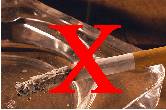Don't Miss
- Could Your Grocery Store Meat Be Causing Recurring UTIs?
- Are You Making This Expensive Thermostat Error This Winter?
- Recognizing the Signs of Hypothyroidism
- 10 Strategies to Overcome Insomnia
- Could Artificial Sweeteners Be Aging the Brain Faster?
- Techniques for Soothing Your Nervous System
- Does the Water in Your House Smell Funny? Here’s Why
- Can a Daily Dose of Apple Cider Vinegar Actually Aid Weight Loss?
- 6 Health Beverages That Can Actually Spike Your Blood Sugar
- Treatment Options for Social Anxiety Disorder
How to Avoid a Smoking Relapse Over the Holidays
By LadyLively on December 30, 2014


The holidays can cause former smokers to reach for a cigarette, experts warn. But if you expect temptation, you’ll be better prepared to fight it, they say.
The group NYC Treats Tobacco, led by the NYU School of Medicine’s department of population health, offers several steps former smokers can take to stay smoke-free until the holiday hoopla subsides:
- Think back. Reformed smokers craving a cigarette should try to remember why they quit in the first place. Write down the top three reasons for quitting and post this list in a visible place to serve as a reminder and motivator to not smoke.
- Be proactive. Expect temptation to smoke. Have a plan in place that outlines how to handle triggers, such as alcohol or overeating, which can lead to cigarette cravings. Instead, be prepared with low-calorie snacks, gum or water. Have a plan for all possible triggers.
- Don’t give in. When the urge to smoke hits, do one of the following: delay smoking until the urge passes, drink water, distract yourself by doing something else, try deep breathing, or find a friend or relative and discuss how you are feeling.
- Treat yourself. Staying smoke-free deserves a reward. Use the money saved from not buying cigarettes to buy something new.
- Get help. If a relapse occurs, don’t wait to seek help from your doctor or local smoking cessation resources. It’s important to get back on track immediately. Many people don’t quit on their first attempt. Getting support and expert help increases the odds of long-term success.
More information
The U.S. Centers for Disease Control and Prevention provides more tips on how to quit smoking.
Source: HealthDay
Copyright © 2026 HealthDay. All rights reserved.










